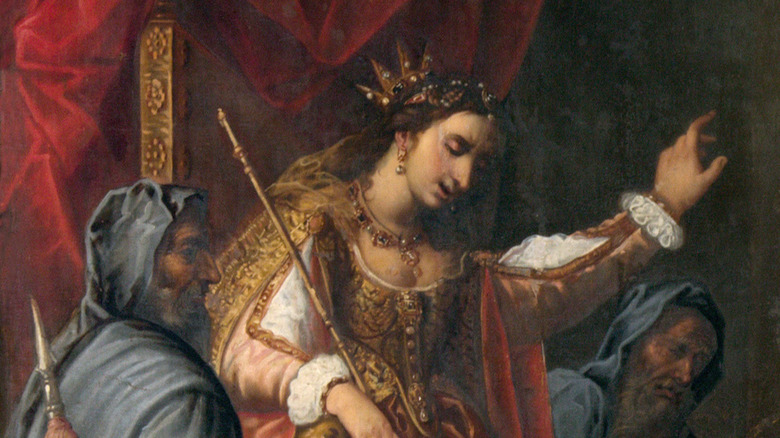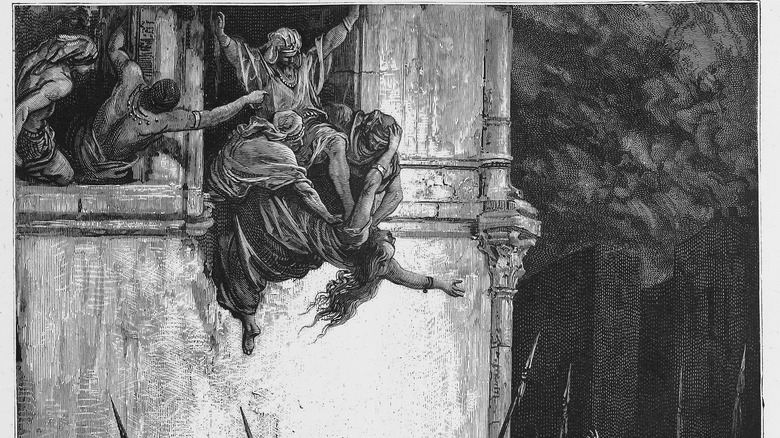The Truth About Queen Jezebel In The Bible
The Bible's many books have various female characters, though not many are talked about in a very flattering light. A good number are even presented as downright villainous, including the Phoenician queen Jezebel. Her name has since been synonymous with power-hungry women for so long that women have taken back the name to show their strength, The Conversation notes. But who is Jezebel, and was she really as bad as the Bible makes her out to be?
First, we must look to her story in the Good Book, where Jezebel appears in both books of Kings. According to National Geographic, she established pagan worship of the god Baal in the Northern Kingdom of her husband, King Ahab of Israel. Jezebel ordered the murder of the prophets of Yahweh and angered the prophet, Elijah. When Ahab learned Naboth, the owner of a vineyard beside the palace, refused to sell, Jezebel encouraged the king to order his arrest, and he was later stoned to death.
The violent turn of events prompted Elijah to curse Ahab and his family. The king eventually died in battle, his first son Ahaziah fell from a window, and his second son, Jehoram, was overthrown in a bloody coup. Even more gruesome, Jezebel was thrown out of a window, where her dead body was trampled by horses and mangled by dogs, Biography reports.
Interestingly, a man called Jehu planned to murder the queen before her death. Hearing of this, Jezebel dressed in finery and put on makeup, which people interpreted as an attempt to seduce Jehu.
Queen from a modern city
Jezebel might be more than a story — some believe she was a real person. The Jewish Women's Archive claims Jezebel is the daughter of Ethbaal, king of the Phoenician city of Tyre. Alive in 9 B.C., she allegedly possessed a fierce temperament and angered many with her worship of pagan gods.
Not much is known of Jezebel's life before marrying Ahab, Biography reports. It is assumed she grew up in refined surroundings, being a princess from a cosmopolitan city. She got the best tutors and was raised in a household that worshipped multiple deities. To cement a political alliance, Israel's king arranged for Jezebel to wed Ahab.
But Israel was a more conservative kingdom with a different religion. Unwilling to change her beliefs, Jezebel brought 800 prophets of Baal with her to slaughter her religious enemies. It's not explained why she ordered the death of Yahweh prophets, but it's assumed it was so she can better establish the worship of Baal. Elijah killed her Ball prophets in retaliation, and Jezebel swore she would have the prophet murdered, so he fled.
Jezebel's actions against prophets of Yahweh, threats against Elijah, and orchestration of Naboth's death painted her as a truly evil person. But it's important to remember that it was the Bible that painted Jezebel as wicked — a power-hungry and promiscuous woman who used her status to get what she wanted. And there's a possibility she wasn't wholly evil.
Jezebel might have been painted as a villain
Jezebel's portrayal may have more to do with the men who wrote the Bible than her actual personality, explained the Jewish Women's Archive. After all, most powerful women were not treated well in the text.
The Conversation said that Jezebel's name has become synonymous not just with wicked women but also with promiscuity. However, by all accounts, Jezebel was a loyal wife. She is said to have put up with Ahab's many moods and tried her best to protect his interests, even going so far as to orchestrate the end of his enemies.
Instead, the queen's sins seem to be directly connected to her being a foreign woman who was unafraid to wield her power. The writers claimed she was promiscuous, fully intending to show she was disloyal to her husband as well as the faith of Israel. The Bible also used the fact that she put on makeup as evidence of her desire to cheat and take power for herself.
Per Jewish Women's Archive, Jezebel held monarchic — or royal ruler — power, which was believed unfit for a woman at the time. And those who wrote her story might have felt the need to curb that strength. They didn't want someone foreign intruding on their traditions and wanted to preserve their culture. Of course, Jezebel might have committed criminal acts, but we likely won't ever be able to confirm if this is true.


